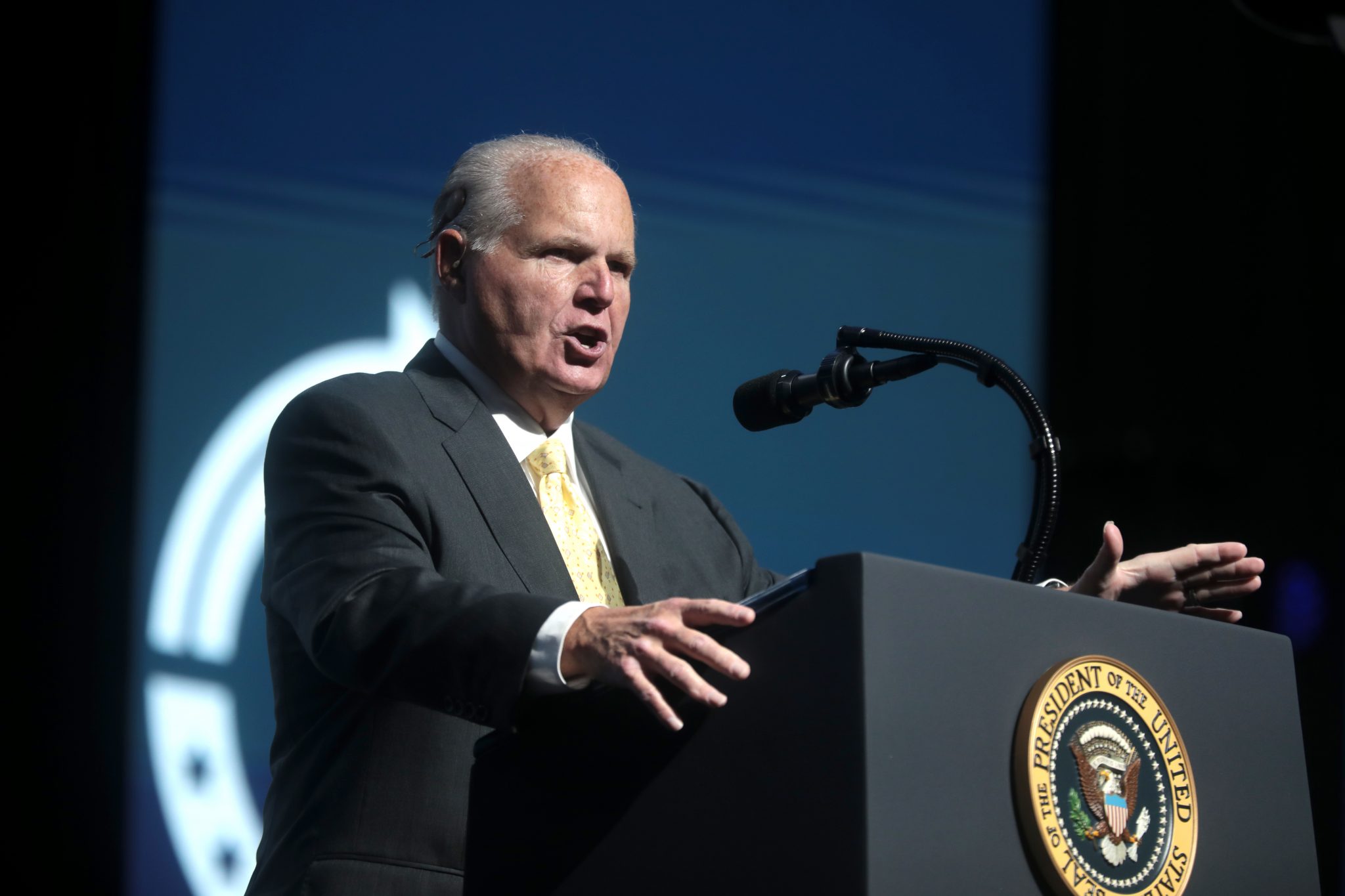On January 20, 2016, when Donald Trump’s surprisingly strong presidential campaign was dividing conservative leaders, Rush Limbaugh explained that his popularity among grassroots conservatives proves that they are not united around conservatism:
[Conservatism is] not the glue that unites them all. If it were, if conservatism — this is the big shock — if conservatism were the glue, the belief and understanding of deep but commonly understood conservative principles, if that’s what defined people as conservative and was the glue that made the conservative movement a big movement, then Trump would have no chance. He literally would have no chance. Because, whatever he is, he’s not and never has been known as a doctrinaire conservative…
…if conservatism were this widely understood, deeply held belief system that united conservatives, and united people as conservatives, then outsiders like Trump wouldn’t stand a prayer of getting support from people…
Therefore, it’s safe to conclude that there are other things at play here that make people conservative …The thing that’s in front of everybody’s face, and it’s apparently so hard to believe, it’s this united, virulent opposition to the left and the Democrat [sic] Party and Barack Obama.
For Limbaugh, to render this analysis was shocking. He was acknowledging that all that binds conservatives is hating liberals. Even with his extraordinary clout, Limbaugh couldn’t forge a belief system, a positive vision. He could only harness grievance.
Perhaps in all of history, no single conservative has had as big a media megaphone for such an extended period as had Rush Limbaugh. His daily radio audience, which he held for more than three decades, was estimated to top 15 million. (The premier conservative voice before Limbaugh, William F. Buckley, Jr. almost certainly did not have that kind reach with National Review and PBS‘s Firing Line.) Bill Clinton once lamented that he didn’t have as big a megaphone.
For three hours a day, almost every day, Limbaugh styled himself as the lone faculty member of the “Institute of Advanced Conservative Studies.” He published two books during the Bill Clinton presidency, detailing his worldview. He published a five-book children’s history series during the Obama presidency, trying to shape the worldview of the next generation. Yet, by 2016, he was fully aware that, despite the billions of words he disseminated, many conservatives are not unified around conservative principles.
Rush Limbaugh defined conservatism for a generation. If conservatives are no longer animated by conservatism, few, if any, deserve more blame than him.
Limbaugh, of course, didn’t become a multi-millionaire with lectures on Fredrich Hayek or Edmund Burke. He was a polarizing culture warrior who trafficked in racism, sexism, and homophobia. He was more animated by virulent opposition to the left and the Democrat [sic] Party and Barack Obama than the details of effective public policies. By the time of Trump’s 2016 Republican convention, Limbaugh had dispensed with any concern about Trump’s conservative bona fides. “Finally, at a Republican event, finally [we] saw Obama and Hillary exposed as dangerous liars and security threats. Finally, a Republican event where Barack Obama and Hillary Clinton were properly attacked and categorized.”
But electing a president primarily animated by virulent opposition to the left and the Democrat [sic] Party and Barack Obama did not make for a successful presidency. And it has left conservatism unmoored and undefined.
Limbaugh further did conservatives a disservice by sparing them the truth. Wednesday afternoon, I talked about Rush’s legacy with my conservative friend and “The DMZ” podcast co-host Matt Lewis. “I used to listen to Rush and take his retelling of news events as gospel,” he told me, “But once I started following politics closely and even seeing politics play out first hand, I noticed that his framing of events was often not always accurate. And I began to wonder how much of what I had learned and accepted from him over the course of years had been likewise skewed.”
In 2016, Lewis published a scathing book on the state of the Republican Party called “Too Dumb to Fail,” in which he counseled talk show hosts “who truly care about advancing the conservative movement … to be more prudent and to accept the fact that they have been granted a huge responsibility and a big megaphone, with the knowledge that their words have consequences.”
Limbaugh did not take Lewis’s advice. Instead, he created narratives detached from reality. He may have hit his nadir two months ago when grappling on-air with Trump’s defeat: “I actually think that we’re trending toward secession. I see more and more people asking what in the world do we have in common with the people who live in, say, New York? What is there that makes us believe that there is enough of us there to even have a chance at winning New York?”
Yet President Joe Biden’s pandemic relief plan currently enjoys widespread support, support that extends across party lines. There is a lot Americans can agree upon once the fog of polarization is lifted—a fog that Limbaugh pumped into the atmosphere for years.
Limbaugh’s “advanced conservative studies” amounted to little more than bigoted, negative partisanship. His polarized view of America was repudiated last November. Over the course of his tenure as America’s leading conservative, conservatism atrophied.
If conservatives are going to become once again an intellectual force that can generate serious ideas and contribute to American governance, after they finish mourning Limbaugh, they must bury his approach to conservatism.



